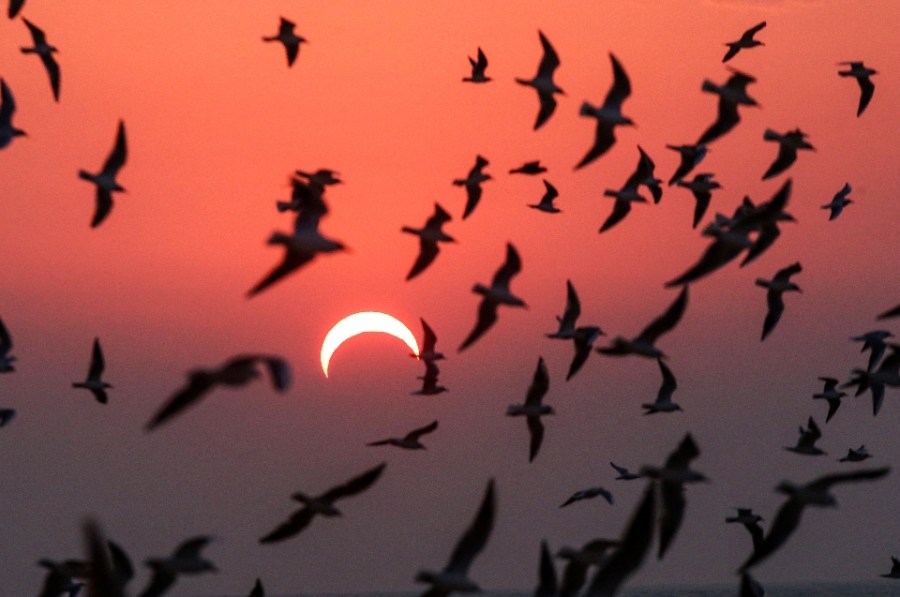CLEVELAND (WJW) – In just weeks, the total solar eclipse will temporarily envelop Northeast Ohio in darkness in the middle of the afternoon.
Plenty of Ohioans have been preparing for the spectacle for months, with dozens of schools closing and groups renting out baseball fields to catch the once-in-a-lifetime moment, but how will the solar eclipse affect our local wildlife?
Animals expected to respond
According to Bev Walborn, outdoor experience manager at the Lorain County Metro Parks, expect animals to respond to the environmental conditions that are happening.
“They won’t know that it’s a solar eclipse. What they will know is that the sky is getting darker,” Walborn said.
Animals that act differently at dusk, such as birds, will likely go about their evening routines during the eclipse.
What about birds?
“Especially folks who will be viewing at Lakeview Park with Lorain County Metro Parks, we may see the gulls heading back over land to roost in responding to the darkness,” she said.

Walborn said some birds like tree swallows and barn swallows will flock before they go to the roosting site.
“There are some birds that tend to sing more at dusk like cardinals and robins, so they might start to become more vocal during totality,” Walborn said.
Amphibians?
She says amphibians could become more active, since the eclipse falls during mating season for most Ohio-native frogs.
“You might hear spring peepers starting to call if it’s getting dark or wood frogs or tree frogs who all have different kinds of sounds that they make,” Walborn said.
Nocturnal mammals?
Some mammals that come out more at dusk and dawn might be active as well.
“Bats that hibernate will start to be active in March and April, so maybe some bats might emerge from their roost and start to fly around to catch insects,” Walborn said.
Insects?
Walborn says we shouldn’t expect to hear insects like crickets.
“With it being April 8 in Northeast Ohio, the insects, they’re not going to be calling that early. The insects use that call to attract mates and we don’t normally hear those insect sounds until summertime,” she said.
How will they react when it ends?
So, how will animals respond when totality ends?
“Some of the animals might respond quicker to the light coming back and some may pause a little to figure everything out, but most of them will respond again to daylight and it shouldn’t affect them at all,” Walborn said.
How you can help
With the eclipse approaching fast, NASA is funding a project to better understand the behaviors of animals and insects during the astronomical phenomenon.
The Eclipse Soundscapes Project is expanding on a similar study back in 1932 that reviewed about 500 observations, when an eclipse at the time passed over the U.S. and Canada, according to NASA.
Project leaders are asking the public to participate by sending in audio recordings or written reports of what they see, hear and feel during the eclipse. Learn more about how you can get involved in the study here.
What Akron Zoo expects
Back in Northeast Ohio, the Akron Zoo is participating in the Eclipse Soundscapes Project, monitoring how the eclipse will affect the animals there.
Carrie Bassett, education mission manager at Akron Zoo, is coordinating the project. She pointed out there have been very few studies looking into animal behaviors during eclipses.
“We’re hoping to see little behavior changes,” Bassett said. “Maybe some of our zoo animals think it’s time to go to bed for the evening or time to get an evening meal. Maybe some of our animals will wake up more than they normally would if they’re nocturnal.”
In a study archived in the National Institutes of Health, researchers looked into the behaviors of 17 animal species at the Riverbanks Zoo in South Carolina during the 2017 total solar eclipse.
According to the study, while some animals like grizzly bears, seals and sea lions didn’t seem too affected, most the animals started going about their nighttime routine or appeared anxious during the eclipse.
Researchers say, during totality, the female gorillas walked up to the indoor enclosure like they normally would in the evening, while the male gorilla charged at the glass. Meanwhile, giraffes were seen huddled by the barn and started galloping when totality ended.
Other animals like the Komodo dragon, flamingos, baboons and lorikeets showed signs of anxiety, the study says.
FOX 8 asked Bassett if they’re expecting to see something similar at the Akron Zoo.
“It wouldn’t surprise me if we see a little bit of anxious behavior,” she said. “We will have staff out monitoring our animals… If we see any negative reactions, we’ll make sure we step in and take care of our animals to the best of our ability.”
Bassett said she’s excited for the eclipse to get the community interested in science happening in their own backyard.
“Having people tuned into nature and tuned into science in the way that this eclipse is going to bring, I think that’s the most exciting thing,” Bassett said.
Walborn says the Lake County Metro Parks will have an astronomer speaker series leading up to the eclipse and several viewing areas on April 8. She urges everyone to grab a pair of solar eclipses glasses and safely watch the celestial event.
“Having experienced the 2017 eclipse, which was an amazing event in itself, I’m really looking forward to experiencing totality here,” she said.
Learn more about the Lorain County Metro Parks’ solar eclipse events at their website.
Suggest a Correction
